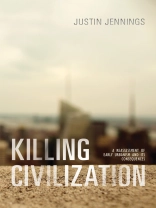The concept of civilization has long been the basis for theories about how societies evolve. This provocative book challenges that concept. The author argues that a “civilization bias” shapes academic explanations of urbanization, colonization, state formation, and cultural horizons. Earlier theorists have criticized the concept, but according to Jennings the critics remain beholden to it as a way of making sense of a dizzying landscape of cultural variation. Relying on the idea of civilization, he suggests, holds back understanding of the development of complex societies.
Killing Civilization uses case studies from across the modern and ancient world to develop a new model of incipient urbanism and its consequences, using excavation and survey data from Çatalhöyük, Cahokia, Harappa, Jenne-jeno, Tiahuanaco, and Monte Albán to create a more accurate picture of the turbulent social, political, and economic conditions in and around the earliest cities. The book will influence not just anthropology but all of the social sciences.
Sobre o autor
Justin Jennings is the curator of Latin American archaeology at the Royal Ontario Museum in Toronto and an associate professor of anthropology at the University of Toronto. His recent books include Beyond Wari Walls: Regional Perspectives on Middle Horizon Peru (UNM Press), Tenahaha and the Wari State: A View of the Middle Horizon from the Cotahuasi Valley, and Globalizations and the Ancient World.












